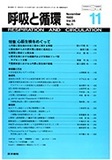Japanese
English
- 有料閲覧
- Abstract 文献概要
- 1ページ目 Look Inside
糖尿病患者においては,高血糖およびそれに伴う代謝異常の関与も加わり,心機能低下や心電図のST-T変化を認めると報告されている1〜6)。しかし,これらの異常も食事療法や薬物療法による高血糖の是正により,心機能は改善し心電図のST-T変化も消失すると,われわれは報告してきた7,8)。
一方corrected QT時間(以下QTc)に関しても数多くの報告9,10)があり,心筋梗塞患者11〜13)や薬剤14,15)などにて延長すると言われている。同様に糖尿病患者においてもQTcは延長すると述べられている16)が,糖尿病のコントロール状態との関係についての検討はない。
In order to elucidate the effect of metabolic dis-orders of diabetes mellitus on the corrected QT interval (QTc), an examination was performed at 8: 00~9: 00 a. m. after an overnight fast before and after diabetic treatment. The standard 12-lead elec-trocardiograms were recorded in 13 diabetic patients. From these tracings, the QT intervals were measured from lead II on 3 beats, then the QTcs were calcu-lated according to Bazett's formula. At the same time, the FBS and the HbA1 were measured before and after diabetic treatment.
1) There were significant correlations between the QTc and the HbA1:
QTc (ms)=11.8 HbA1 (%) 268, r= 0.60, p<0.05
QTc (ms)= 13.2 HbA1 (%) + 276, r = 0.70, p<0. 01
before and after treatment, respectively.
2) There were no significant correlations be- tween the QTc and the FBS : r=0. 41,0. 54 before and after treatment, respectively.
These results indicate that the QTc in diabetic patients are influenced by the control of blood sugar, especially HbA1.

Copyright © 1988, Igaku-Shoin Ltd. All rights reserved.


